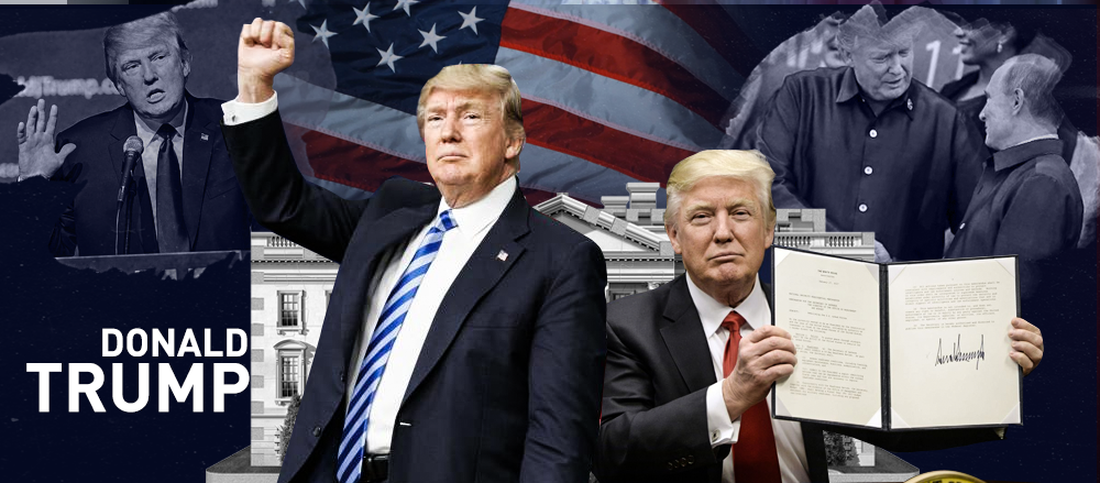In spite of never ending controversies, unprecedented media attacks, boneheaded mistakes, and chaos swirling around President Donald Trump, his Administration has kept many campaign promises made one year ago.
While at least half of Americans and possibly much of the world community might disagree with his policies and methods, Trump has had a productive year reengineering America. For better or worse!

Trump and the Republican-controlled Congress have been criticized for being unproductive with respect to legislation passed, and the Barack Obama first Congress was more productive. Actually, under Trump, Congress passed 46 substantive bills, while under Obama they passed 36.
Some might think these numbers are low overall. Possibly. Congress has been in severe gridlock for several decades, with the political opposition blocking most actions by the majority.
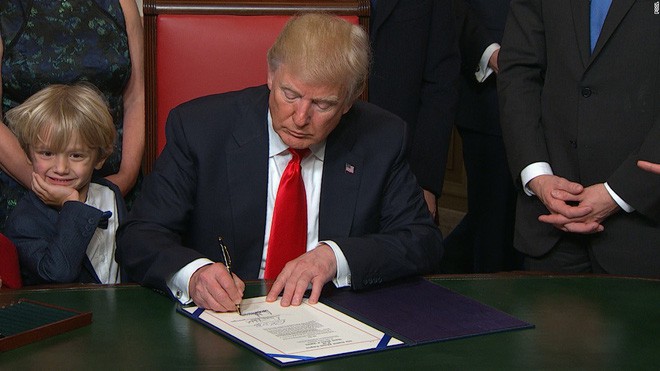
Under Trump, Congress passed 46 substantive bills, while under Obama they passed 36. Photo: Pool/CNN
Congressional gridlock forced Obama to by-pass Congress, using executive powers to get things accomplished. Trump has used the same tactic to reverse much of what Obama had done, leaving his legacy in shambles. Many critics bemoan the use of presidential powers to circumvent Congress. Doing so is a sad legacy for both Trump and Obama.

Americans will typically put up with just about anything so long as they are enjoying a booming economy. Presidents are happy to take credit for economic good times even though they have little to do with growing the economy, except around the margins. Presidents, though, can negatively affect economic growth.
Were it not for the healthy US economy, Trump would be in much more trouble than he already is. But, he can take credit for the economy. Trump over the first year of his presidency has been a cheerleader for the economy, promoting business, reducing taxes and eliminating regulation.
Trump has been successful in extracting commitments of $300 billion from Asian countries to invest in US businesses. More foreign direct investment in the US will offset the country’s large trade deficits with many countries, especially China. It is unclear how much of this investment will actually occur over time.
The Dow Jones Industrial Average (DJIA) rose from 19,732 points in January 2017 to a record 25,534 in January 2018. Unemployment rates are at a 16-year low at 4.1%. GDP growth has been at 3% over the past two quarters. Home prices have risen 3%.
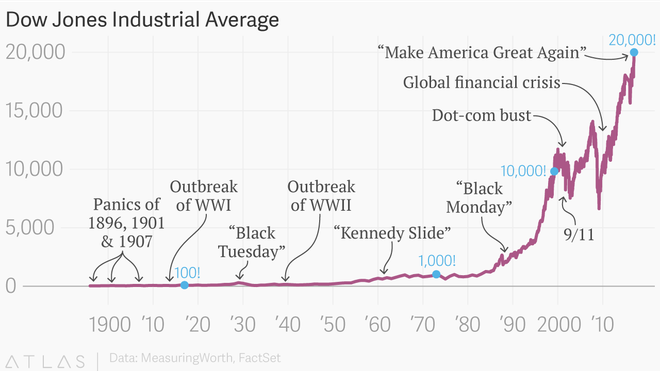
The Dow Jones Industrial Average (DJIA) reached a record of 25,534 in January 2018. Photo: Quartz
The US Congress passed a tax bill, with tax cuts not seen since President Ronald Reagan’s bill in the 1980s. Corporate tax rates fell to just 21%, going from one of the highest in the world to one of the lowest.
Individual income tax reductions put more money back in taxpayers’ pockets. The reforms are not without risk: some $1 to $1.5 trillion will be added to the US debt now at $20 trillion over the next 10 years.
The tax bill also eliminated a major Obamacare mandate. Obamacare is the highly controversial and dysfunctional national health insurance scheme. Americans will no longer be required to purchase health insurance. Trump earlier in the year failed to repeal all of Obamacare, but he takes credit for unraveling it by removing the individual mandate.
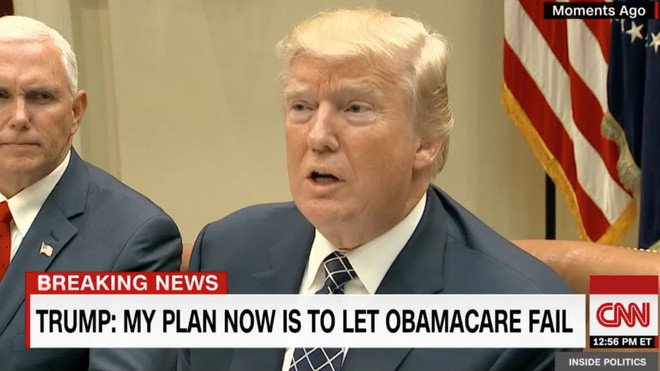
Trump is "at war" with Obamacare. Photo:CNN
Trump’s White House reports substantial savings of $8 billion in having eliminated government regulations in 2017 and another $9 billion in progress for 2018. Trump has eliminated 22 regulations for every new regulation.
Regulations mandating overtime pay for managers have been repealed as has the "Net Neutrality Rule" requiring Internet operators to treat all customers the same—with respect to speed, access and content.

Trump’s successes in international affairs, from his perspective, involve shaking up the world order to promote US interests first. Some of his "successes" may prove to be detrimental to the US.
Pulling out of the free trade agreements under the Trans Pacific Partnership (TPP) is a major accomplishment. Trump believes that these agreements, with Vietnam a potential big winner, disadvantaged the US.
Trump wants to renegotiate TPP as separate bilateral agreements. Trump seems not to realize that trade is critical in growing the US economy and is important for US security interests. China is now filling the vacuum left by the US withdrawal. But, Trump promised he would pull out of TPP, and he did.
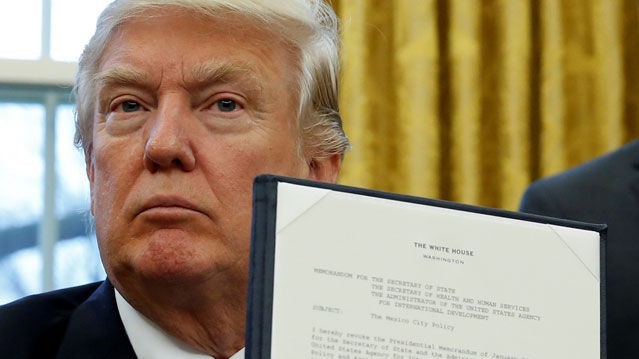
Trump promised he would pull out of TPP, and he did. Photo: AP
Early on, Trump attacked the NATO mutual defense agreement with European countries, claiming that Europeans did not contribute a fair share to their own defense, relying instead on the US. Trump’s threats were taken seriously.
Twenty-five of 29 NATO countries are now increasing their defense budgets.
Trump and North Korean dictator Kim Jong-un have been locked in a war of words over North Korea’s development of nuclear weapons aimed at the US. Kim said that he has the nuclear launch button on his desk, to which Trump responded that his button was bigger than Kim’s. Many observers felt that this antagonistic approach would lead to nuclear holocaust.
They were apparently wrong: South Korean President Moon Jae-in announced that South and North Korea would be holding peace talks. Moon publically credited Trump with this.
Trump did not like Obama’s détente with the Cuba. Obama opened up trade and expanded diplomatic relations. Trump reversed Obama’s Cuban initiative. Trump accused the Cuban government of using acoustic weapons to injure US embassy staff, something Cuba denies. Trump expelled Cuban diplomats from the US.
Recently, Trump again shocked the diplomatic world with his directive to move the US Embassy from Tel Aviv to Jerusalem. Trump claimed that he was just accepting reality: Jerusalem is the capital of Israel. Trump’s intent was to shake up Israeli-Palestinian peace talks that have been stalled for decades. UN nations, with the exception of about 30, voted to condemn the action. Trump responded by reducing the UN budget by $250 million.
Perhaps Trump’s greatest accomplishment was the defeat of the radical Islamic State (IS) in Syria and Iraq. In 2013, IS began creating its caliphate by taking over large swathes of Syria and Iraq, in the process creating millions of displaced people and refugees, along with 400,000 deaths.
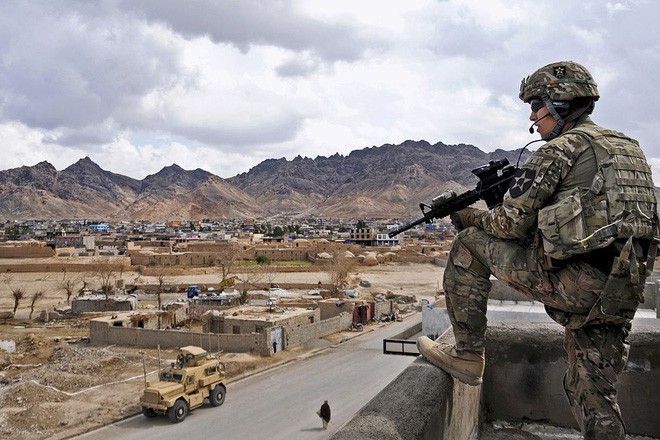
A US soldier in Afghanistan. Photo: Wikimedia Commons/Defense.gov
President Barack Obama dithered in confronting for nearly four years, not wanting to get more involved in the Middle East. Trump, on taking office, put more troops in the fight and allowed the military to go after the terrorists. In partnership with Iraq, rebel groups, and allies, IS was defeated in November.
Trump also began building up troops in Afghanistan. Obama had withdrawn many, allowing the country to drift back into Taliban control. Critics claim that Trump is falling into the same trap as had Obama: getting bogged down in the Middle East.

In terms of long term impacts, Trump’s success in appointing Supreme Court and federal court judges might cement some of his achievements to date. The leading conservative judge on the 9-member Supreme Court suddenly died in 2016. Obama tried to seize the opportunity to appoint a liberal judge to replace Antonin Scalia.
The Senate, controlled by Republicans, refused to consider a replacement, waiting instead for Trump to take office. Trump nominated a conservative justice, maintaining ideological balance on the court.
Trump Takes Oath of Office. Source: ABC News
Trump has been successful in appointing federal judges to the court, appointing 12 judges to Obama’s 3 during the first year. Federal judges are critically important.
Liberal judges have systematically blocked many of Trump’s policies during the first year, including his ban on immigrants from Muslim-majority countries; sanctuary city policy to compel cities to turn over criminal, illegal aliens to federal agents; and expelling illegal immigrants allowed to stay in the country under Obama.
In addition to presidential executive orders, the courts are another powerful tool to bypass Congress, leaving policy decisions in the hands of unelected federal judges.

Trump’s philosophy on climate change is that regulations are so expensive for business that it makes the US uncompetitive with other countries who are polluters.
Trump shocked the world when he pulled the US out of the Paris Climate Accords which voluntarily committed countries to lower greenhouse gases and carbon emissions.
Trump was annoyed that China, the world’s major polluter, could delay its climate controls for years while it built its economy on coal and oil electricity generating plants. Ironically, the US is the only advanced economy that is sustaining growth and reducing emissions.
Trump also is eliminating environmental regulations that penalize American firms. Obama’s signature "Clean Power Plan" that regulates coal and oil electricity generating plants out of business is in the process of being repealed.
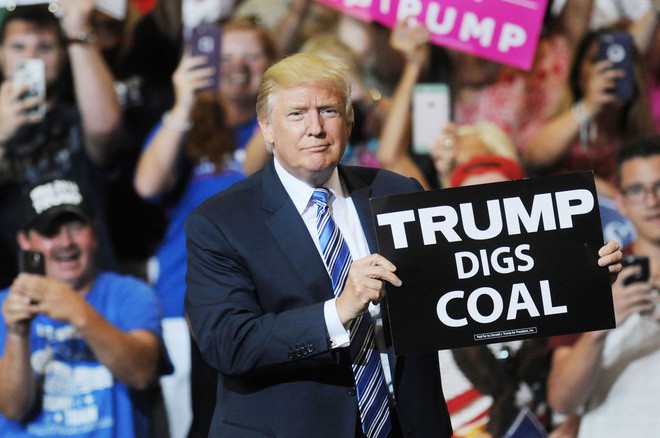
Trump also reduced regulations to try to promote the dying coal industry: removing regulations on dumping waste. Photo: The Register-Herald
Trump authorized oil exploration in National Wildlife Regions and offshore on America’s coasts. Trump is seeking energy independence from Middle Eastern oil producers and encouraging US exports to allies.
Trump also reduced regulations to try to promote the dying coal industry: removing regulations on dumping waste.
Trump reversed Obama’s actions to kill oil production by making it impossible to move oil by pipeline. Trump removed legal barriers to the Dakota Pipeline and Canadian-owned Keystone XL Pipeline that will expand the massive network of pipelines already running across the US.
Trump is clamping down on scientific information and data gathering on climate change. His senior policy makers have ceased gathering and reporting data, reduced the influence of climate scientists, shutdown climate research offices, and halted funding of climate studies.
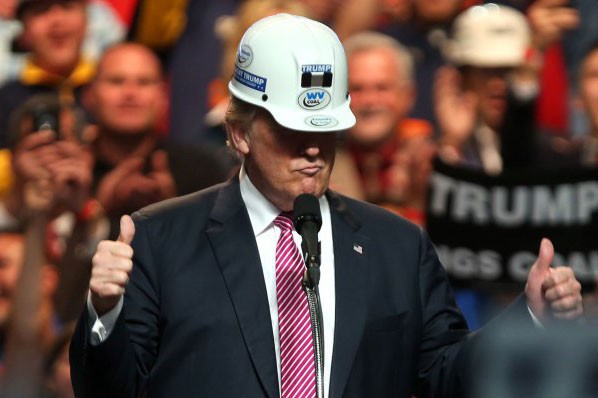
Photo: Getty Images.
Critics claim that Trump’s energy and environmental policies merely delay the inevitable: abandonment of coal and oil in favor of clean, renewable energy.

In spite of the fact that Trump ran for president as a Republican, many believe that he is not one, or a poor one. Early in his presidency, Trump tried to undermine and perhaps destroy the Republican Party establishment. He repeatedly attacked congressional Republican leadership and key Senate and House congressional members.
He supported and praised Democrat opponents against Republicans. He did deals with Democrats without informing Republicans. He sometimes failed to take a leadership role in developing and moving legislation through Congress.
He often expressed support for policies, then suddenly reversed himself. Most importantly, his bizarre twitter ravings and provocative public comments undermined Republicans running for office in November 2018.
Republicans only enjoy a one-vote majority in the Senate. Around five Republican Senators have repeatedly voted against Trump thwarting his agenda. In the House, Republican retirements have reduced their majority to a point where Democrats could take control. Trump risks losing control of Congress for his final two years in office.
This also happened to Obama who was unable to pass much legislation over a five or six year period.
The big question is: will Trump actually take control and undertake the policies he was elected pursue, or will he continue the erratic behavior which is unpredictable and risky. No one knows. Maybe not even Trump.
Trump’s first year accomplishments although pleasing to his supporters, may not be enough to sustain his power.
* For Vietnamese version, click here.
